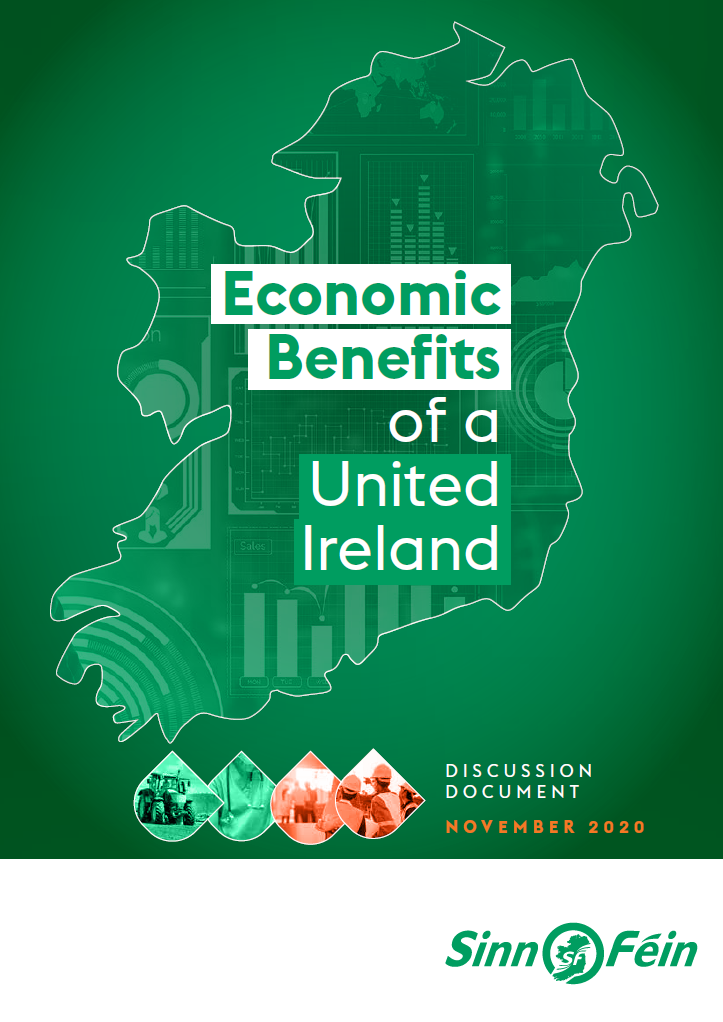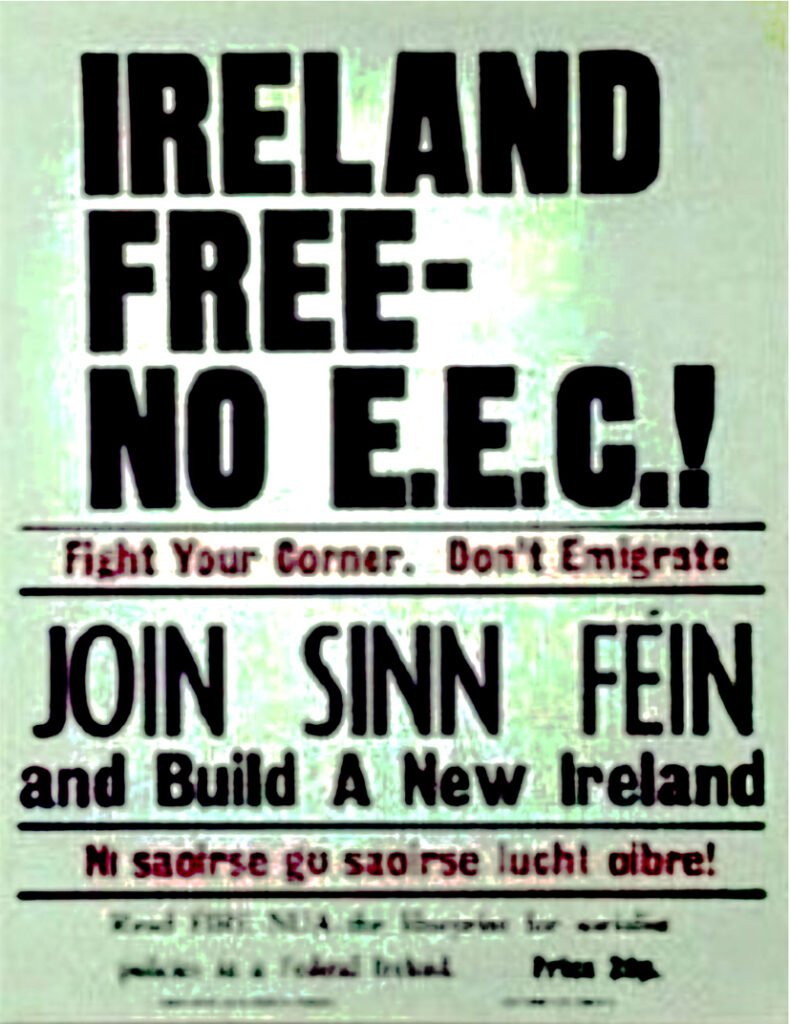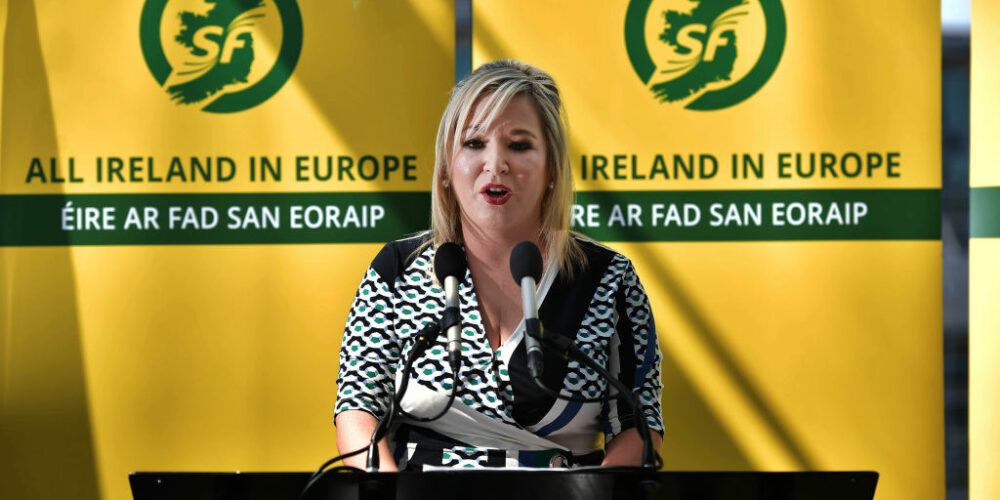Sinn Féin published their discussion document “Economic Benefits of a United Ireland”¹ in November 2020; and, seeing that it’s a discussion paper for “contributing to the ongoing and exciting debate around a United Ireland,” it’s a worthwhile exercise to analyse and to critically engage with Sinn Féin’s vision for a united Ireland.

Two significant factors, Brexit and covid-19, have really accelerated the debate on reunification; and now, as stated in the document, “it is not a question about whether we can afford Irish Unity the fact is that we cannot afford partition.”
The document itself is well presented and very accessible to any reader, while the general narrative and economic benefits of reunification are well argued, from the urgent need for investment and infrastructure in the border region, both North and South, the democratic deficit for citizens in the North, to the “potential for increased economic growth if the economic opportunities of reunification are realised.” The section on “the subvention explained” and its accompanying appendix is a welcome counter-argument to the “we can’t afford reunification” discourse that is dominant in the debate.
At a glance, the paper puts a very positive spin on the possibilities for development, both North and South, and will gain more supporters for the general project of working towards a united Ireland. The main issue I have with this document is that it is too polished—a veneer that is digestible in how they present the national question as a commonsense approach, which in reality is presented as an economic question: i.e. it makes sense economically to unite.
What the paper is clearly missing is a class understanding of the national question—i.e. answering the national question with the social question, a vision for a New Republic that serves the interests of the people before capital, both foreign and domestic. The vision presented by Sinn Féin seemingly is of “business as usual,” where the South merely subsumes the North and carries on with the economic policies that are the hallmarks of a nation beholden to the diktats of the imperialist centres of the EU and the United States, its native representatives, and the political class servicing those interests.
The vision of Sinn Féin is for a pro-EU reunification of Ireland. They conveniently ignore the historical rationale of partition: to deny the creation of an independent, sovereign and democratic republic so as to develop an economy that represents and benefits the interests of the people, rather than those of capitalists, domestic and foreign. This has been denied to all of Ireland because of partition, and we will remain beholden to imperialism while we are members of the EU.

That Sinn Féin are not presenting themselves as a “leave the EU” political party, or even an anti-capitalist party for that matter, is fine, but they can’t have it both ways either. They can’t be pro-EU, pro-Big Business, and at the same time present themselves as an alternative to the political establishment, being on the side of workers, of the people, while the rules, regulations and treaties of the EU forbid any alternative to the private capitalist mode of production. This is just selling people a pup.
Under the heading “Cost of partition—a democratic deficit that stunts economic development” and “Benefit of United Ireland—decision making by locally elected representatives and bespoke macroeconomic planning,” it is difficult to take this seriously as a cornerstone of their vision of a united Ireland. Even with a united Ireland, what fundamental change is this presenting to the Republic’s democratic institutions, with its well-known “parish pump” politics, where the celebrity or popularity of an individual TD is the basis for local or regional development, rather than proper local and regional planning being co-ordinated by a national strategic development plan?
Also, our democratic institutions within local authority areas have been stripped of finance and initiative and are more in keeping with inspectorates, as opposed to bodies that have the power, resources and authority to develop local or regional plans of work—but no, as long as you can lobby your local TD then we have a plan!
Furthermore, the macro-economic planning of the country cannot be set by the sovereign wishes of the people, represented by a political party in government, while under the dominion of US and EU interests, rules and regulations. Sinn Féin clearly have opted to leave these “obstacles” out of their vision, as it isn’t part of the cosy EU Ireland they are seemingly selling.
In the section on a cleaner, greener Ireland they correctly point out the irrationality of partition in trying to make a transition to a zero-carbon economy and the rationality for an island nation to co-ordinate and develop a sustainable energy policy. With the continuing climate emergency and the need to take immediate action, this in fact is probably one of the most convincing arguments for reunification (for those who need convincing).
Their vision, however, falls short in a plan of implementation. It doesn’t specify who is to create the “rapid increase in high-skilled green collar jobs.” The state? Private companies? Which is fair enough, given that it is only an outline of the need for it; but if a party is offering a vision for a united Ireland under the EU, then it can only offer a business-as-usual approach, i.e. let the public purse pay for the infrastructure and construction, through loans, grants, or public works, paying the private companies exorbitant prices while these companies reap the reward and profit from our public and environmental needs. Indeed any plan would be dictated by and left to private capital to lobby and direct government policy that suits their profit-driven interests.
The document then points to “the experience of German reunification as a useful example of how planned economic integration and investment, including from the EU, can substantially improve economic conditions in the smaller jurisdiction involved in transition.” It might be of interest to Sinn Féin members and supporters, as the discourse on reunification continues, to look further into that process. I would point people to an article by Jenny Farrell in Socialist Voice in 2019 titled “The return of the German Spirit.”²
This is not to argue that reunification isn’t desirable—on the contrary, it is an essential element in the struggle for a united, independent workers’ republic—but rather to highlight the role of capital and its personification within (then) West Germany and the EU in decimating public industries and infrastructure and the social and cultural values that were part of the German Democratic Republic, creating false narratives about the history of the GDR, espousing an anti-communist doctrine, when in fact West Germany exonerated and employed former Nazi Party members in official government positions.
Just as a case in point regarding the “noble” EU project: members of the EU in December 2020 (Ireland included) abstained en masse on a UN resolution on “Combating glorification of Nazism, neo-Nazism and other practices that contribute to fuelling contemporary forms of racism, racial discrimination, xenophobia and related intolerance”; and yet in 2019 the same EU members overwhelmingly voted in favour of a motion equating Nazism with communism—a criminal distortion and revision that “draws the impossible equivalence between those who built Auschwitz and those who liberated it.”³
This is the danger with Sinn Féin’s project as it now stands. It isn’t for creating a new Republic but for the old Republic taking over the North (not that the North is in any way a shining light of democracy or an economic powerhouse!), fully embracing an EU that not only abstains from denouncing fascism but promotes the criminalisation and denunciation of anti-fascists; that is creating a permanent arms fund (PESCO) and EU army, to which the Irish state is obliged to contribute up to 2 per cent of its GDP (that’s more than €6 billion a year),⁴ and is once again attempting to enshrine within transatlantic trade deals the primacy of private capital over national state laws in the form of the Comprehensive Economic and Trade Agreement (CETA).⁵
It is important to point this out, because people should be under no illusion that uniting Ireland under the EU is a pro-capitalist, pro-imperialist united Ireland, arming and equipping itself for a war against humanity and nature rather than a war for humanity and nature. Any notion that we can build and plan our economy by sovereign and democratic means under these circumstances is simply beyond the pale.
It is at this point I am glad that this is a discussion document rather than a policy document or campaign manifesto, because I really believe that the project for a united Ireland could be one of those rare opportunities to allow broad public participation, debate and consultation on a truly national scale, never before seen in this country, to begin a process towards a new Republic.
Sinn Féin at some point may be in a position to drive this, and so what better contribution to make than to facilitate a democratic revival, with the prospect of creating a new Republic. Rather than starting from the economic position that reunification is good for business because of Brexit and being a member of the EU, should we not aspire for more? Can we not present a vision that will answer the national with the social question?
The premise of this united Ireland doesn’t need to lead with a Leave campaign for a united Ireland, but should we not at least start from the position that our people, North and South, have a crisis in housing, health, mental health, elder care, and that the services and the provision of those services are totally inadequate, underfinanced, and more and more being left to private, profit-seeking companies to provide?
Or why not take as a starting position that there is a great suffering from poverty and inequality, that regional and national deficiencies in infrastructure, jobs, cultural and social outlets are rampant, and that vital public services are often kept afloat by charity rather than investment, and that there is a huge wealth gap, which no amount of taxation will bridge?
Or should we not take as a starting point that we are witnessing an epoch-making period of changes to the environment, to the earth system as a whole, that will usher in many and varied challenges in the decade ahead, with which we can expect the further spread of viruses and zoonotic pandemics as the quest for more land and industrial farming greatly facilitates and accelerates the animal-to-human transmission of viruses, as a recent report clearly points out?⁶
The prime driver and motive force behind all these crises is the capitalist mode of production, of ever-expanding growth; so should this view not underpin any vision of a united Ireland—sovereign, democratic, and independent of the grip of imperialism?
It is on this basis that we need to fight for a united Ireland and not be sold false promises. The worst outcome with Brexit has been avoided at the eleventh hour, and the economic and social impact of covid-19 is still very much with us for the foreseeable future, with forecasts predicting protracted growth in the developed countries in the Global North and disastrous effects on the countries and people of the Global South.⁷
The reality of this will have devastating effects on people’s jobs, livelihoods, living standards, and general health and well-being; so the fight for a new Republic, for a united Ireland, has never been more pressing and timely, and that, rather than being that small outpost for imperialism on the periphery of Europe, a new Ireland could in fact be a beacon of light and hope to all nations struggling under the boots of imperialist powers.
As Sinn Féin have become more and more popular and acceptable in the eyes of the electorate, the question has to be asked: Is their popularity due to their being perceived as an alternative to the establishment political parties, or because they are becoming more like the establishment parties? If members and supporters believe it is the former, then they must present an alternative to the status quo, especially when carrying out a project for a united Ireland, otherwise it will only be a matter of time before they fully embrace their role as a future government party that oversees the affairs of the capitalist class.
References
- Sinn Féin, “Economic Benefits of a United Ireland,” 2020 (https://tinyurl.com/y7fxr8xv).
- Jenny Farrell, “The return of the ‘German spirit’,” Socialist Voice, November 2019 (https://tinyurl.com/yabknk5v).
- Phil Katz, “Why attempts to conflate nazism with communism should set alarm bells ringing,” Morning Star (https://tinyurl.com/ybw2m26d).
- Clare Daly et al., “PESCO: Irish neutrality and the militarisation of the EU,” 2019 (https://tinyurl.com/y8dp93vv).
- John Sweeney, “TDs must postpone the vote tomorrow to ratify CETA, the EU-Canada trade deal,” People’s News, 14 December 2020 (https://tinyurl.com/yc4c34ps).
- Proveg International, Food and Pandemics Report—Part 1: Making the Connection: Animal-Based Food Systems and Pandemics, Berlin: Proveg eV, 2020 (https://tinyurl.com/y4w79fuf).
- Michael Roberts, “Covid 2021: More calamity ahead?” Committee for the Abolition of Illegitimate Debt, December 2021 (https://www.cadtm.org/Covid-2021-more-calamity-ahead-19255).






